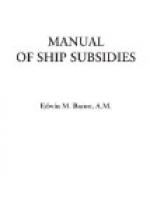[Footnote AY: U.S. consul, Charlottetown, P.E.I. in daily Con. Repts. (Jan. 20) 1911, no. 16.]
[Footnote AZ: Consul General Small, Halifax, in Con. Repts. (Dec.) 1905, no. 303.]
[Footnote BA: The American Year Book, 1911.]
[Footnote BB: American Year Book, 1911.]
[Footnote BC: Lloyd’s Register, 1910-11.]
CHAPTER III
FRANCE
France has been rightly termed the bounty-giving nation par excellence.[BD] She first adopted a policy of State protection of native shipping in the middle of the sixteenth century with the enactment (1560) of an exclusive Navigation Act, forbidding her subjects to freight foreign vessels in any port of the realm, and prohibiting foreign ships from carrying any kind of merchandise from French ports.[BE] This was followed up in the next century with the institution of the direct bounty system to foster French-built ships.[BD]
In the reign of Louis XIV, Colbert, Louis’s celebrated finance minister, perfected (about 1661) an elaborate system of navigation laws, evidently copied from the rigorous English code. This was directed primarily against the commerce of Holland and England, with the ultimate object of upbuilding the home merchant marine and the laying of a broad basis for a national navy.[BF] These acts included decrees giving French ships the monopoly of trade to and from the colonies of France; imposing tonnage duties on foreign shipping; awarding direct premiums on French-built ships. England retaliated immediately. Holland remonstrated first, then made reprisals. For a time under Colbert’s energetic administration of the finances and the marine, “prosperity grew apace. At the end of twelve years everything was flourishing."[BG] Then came the six years’ war (1672-1678) with France and England combined against Holland, and at its end the French merchant marine lay sorely crippled.[BG]
Still the fundamental principles of the stringent navigation laws long remained. A decree in 1681, and subsequent ordinances, defined what should constitute a French vessel; and corporal punishment was ordained against a captain for a second offence in navigating a vessel of alien ownership under the French flag.[BH] By later decrees, no alien was permitted to command a French vessel. An ordinance of 1727 further restricted alien command by shutting out even French subjects who had married aliens.[BH] It was required that every French vessel should be manned by a crew two-thirds of whom were French subjects.[BH] The system of regulations restricting the trade of the French colonies to French ships, and to the home market held till well into the nineteenth century.




